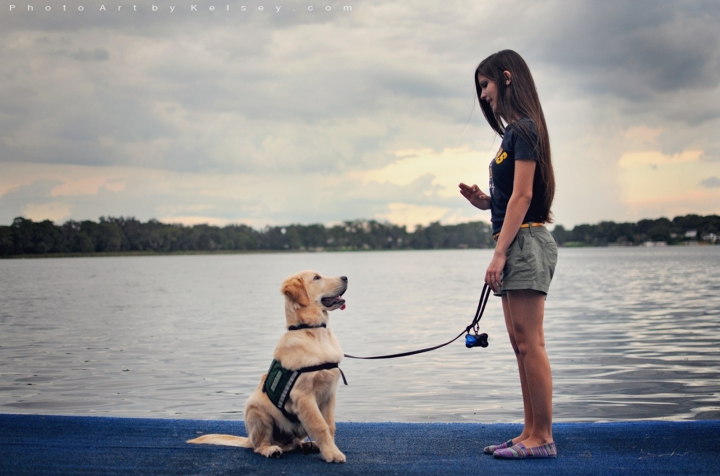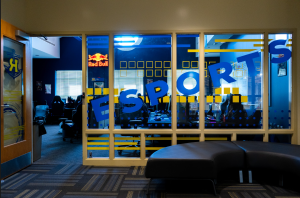
Rachel Denton ‘16 sits in class taking notes, focused on the professor speaking from a lectern at the front of the room. There is a warm weight on her foot and the sound of a light yawn comes from under her desk. If not for that yawn she might, for a moment, forget about Sequoia, the golden retriever puppy quietly curled up at her feet. Sequoia is doing his work just as he should, but getting him there wasn’t so simple.
Denton came to Rollins College in Fall 2012. In September of that year, she began working with New Horizons Service Dogs. There, she learned how to train mobility service dogs by working with older dogs suffering from behavioral issues. At first, Denton’s goal was simple: get permission to have her service dog-in-training on campus. Training a service dog requires two years of total commitment and the ability to spend 24 hours a day with your canine student. Denton and her dog needed access to classrooms, the library, the bookstore, the cafeteria, and just about everywhere else on campus to properly socialize the dog for its future disabled companion.
Unfortunately, the 1990 Americans with Disabilities Act covers only full-fledged service dogs, while the rights of service dogs-in-training and their trainers are left up to the individual state governments. According to Florida statute 413.08, “Any trainer of a service animal, while engaged in the training of such an animal, has the same rights and privileges with respect to access to public facilities [as a disabled individual with a service animal].” Rollins is a private college.
For the first few months of the semester, Denton felt as though she was fighting a losing battle, and to make matters worse, she was fighting it alone. Near the end of the semester she was in chemistry class talking to a friend about her situation. Her friend was Kara Russell ‘16, a fellow freshman with a background in community engagement. “I was pouring my frustrations out to Kara,” Denton said. Russell, also a lover of dogs, realized she could help and decided to use her Leadership Ally Program to do so. Russell was no stranger to completing big projects in the face of adversity; at seventeen, she raised $12,000 for a memorial walk honoring Aaron Vaughn, her friend’s deceased brother, who was part of Navy SEAL Team Six.
Finally, Denton had some much-needed backup. Together, she and Russell approached the dean of the college about access for their service dogs-in-training. They were met with a blunt answer: no. In tears, but not defeated, they sought the advice of Micki Meyer, the director of Rollins Office of Community Engagement. Meyer told the duo, “You tried all the doors. Now try all the windows.”
So, they composed themselves and did just that. They scheduled a meeting with President Lewis Duncan and brought their best weapons: well thought-out legal paperwork and a friendly, albeit sleepy, golden retriever. They laid out their plans, explained that they and their dogs would not be living on campus, and awaited the verdict. Duncan responded, “Why not?”
Now, Denton is training a seven-month-old golden retriever named Sequoia. He regularly attends class and other campus events with her. For Sequoia to attend class with her, the professors must assume liability for anything that happens, though that has not proved problematic.
On Oct. 16, 2013, Rollins Service Independence Training (SIT) club was approved as an official student organization. Russell and Denton say their goal now is to promote disability awareness on campus and get more students involved in the training program. They hope to spend their next two-and-a-half years at Rollins building a foundation for the service dog training program so that it will continue long after they have graduated. “I want this to be my legacy,” Denton says, “Things are starting to look up.”











Be First to Comment